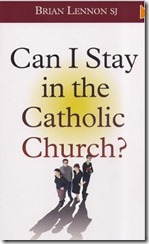 Can I Stay in the Catholic Church?
Can I Stay in the Catholic Church?
It’s a question many Catholics have answered in their droves, leaving the Catholic Church with their proverbial feet. In his latest book, Can I Stay in the Catholic Church? (Columba, 2012), Jesuit Brian Lennon ultimately answers ‘yes.’
But it is his argument that those who choose to stay in the Catholic Church should take it upon themselves to change the church that it is most compelling.
Lennon has worked for more than 30 years with people affected by the conflict in Northern Ireland. He writes out of a lifetime’s experience in the Irish Catholic Church, which has of course in recent years been crippled by the sexual abuse crisis.
The book tackles the abuse crisis in its very first section, asking ‘Who was to Blame?’, and then examines the role of bishops and religious superiors, the Vatican, and lay people. It is helpful that Lennon includes an extended quote from abuse survivor Andrew Madden, as this reminds the reader of the horror of abuse. This keeps his reflections on ‘blame’ from becoming too abstract, especially when he distinguishes between the ‘personal guilt’ of abusers and those who covered up the abuse, and argues that there is a ‘corporate connectedness’ among all members of the church.
This corporate connectedness is key to his argument that lay people must assume responsibility for reforming the church (p. 35):
‘One of the key causes of the abuse crisis was that we maintained a clerical church which marginalised lay people in direct opposition to the focus of Vatican II on the People of God. If this is to change, all of us, clerical and lay, have a corporate duty to bring that change about. We will not break clerical control of the church without vehement and committed lay involvement.’ (emphasis mine)
Indeed, one of Lennon’s main themes is that the teaching of Vatican II on a greater role for laypeople has not been implemented. He says that the Vatican and the Pope have in fact assumed more power than at any other time in the history of the Church.
In a section on ‘Authority in the Church,’ Lennon explains how this has happened, detailing the ‘increasing powers of the papacy in the nineteenth century.’ This of course includes the 1870 decree on papal infallibility, but also encompasses steps taken since Vatican II, such as:
- the Vatican moving to appoint more bishops at the national level (something previously done more often by national-level churches)
- the creation of a Synod of Bishops, answerable to the pope, which pre-empted a collegial structure forming between Pope and Bishops
- a downgrading of the authority of local synods
Lennon claims this centralization of power has been reinforced by a ‘style of Vatican teaching’ that is authoritarian, sexist and homophobic (p. 104-111). He also details how theologians accused of ‘heresy’ have been treated by the Vatican, arguing that the way investigations are carried out violate basic principles of human rights (i.e. theologians’ work is evaluated secretly at the beginning of the process, so that they have no idea they are being investigated, and they are not given adequate time or resources to defend themselves against charges) (p. 111-114). The recent cases in Ireland of clerics from the Association of Catholic Priests being ‘censured’ by the Vatican bring this section of the book closer to home.
At first glance, the sheer power of the Vatican described by Lennon may make the reader despair of the prospects for reform.
But in the last chapter, ‘Repentance and Hope?,’ Lennon makes his case that the church is reform-able, including a number of concrete steps that could be taken (a section titled ‘How will the church change?, p. 147-155).
Among Lennon’s suggestions are changing Canon Law 129 (which currently ‘excludes lay people from the exercise of significant authority in the church,’ p. 155) and calling a new ‘ecumenical council’, a Vatican III so to speak. The case for a Vatican III also has been advanced by fellow Jesuit Gerry O’Hanlon in A New Vision for the Catholic Church (Columba, 2011). But while O’Hanlon wrote of the Irish bishops instigating such a council, Lennon says it won’t happen unless there is a broad-based movement in local churches.
In fact, Lennon places the weight of responsibility for change on lay people, noting that ‘The hierarchical church has often acted in a repressive way towards ordained clergy and religious. It has less power to do so towards laity’ (p. 155).
This may be the case, but Lennon is less clear about how an often wounded and disenchanted laity might be inspired to do this. As befits a Jesuit, Lennon attempts to provide some inspiration in his section on ‘Who is God?,’ which hones in on attributes like forgiveness and siding with the powerless. He hints that Catholics could learn about mobilization from secular social movements, and also from Protestant churches through ecumenical engagement.
Ultimately, I think that Lennon does provide Catholics with some hope that ‘staying’ in their church is a viable option. He suggests what they might do to make that church better. He does leave a lot unsaid – trusting, perhaps in the creativity of lay people (or, he might add, the movement of the Holy Spirit) to inspire change. For him, that would be a church worth staying in.

Gladys is a Professor of Sociology at Queen’s University Belfast and a member of the Royal Irish Academy.
She is also a runner who has represented Ireland and Northern Ireland. She blogs on religion and politics at gladysganiel.com
Discover more from Slugger O'Toole
Subscribe to get the latest posts to your email.